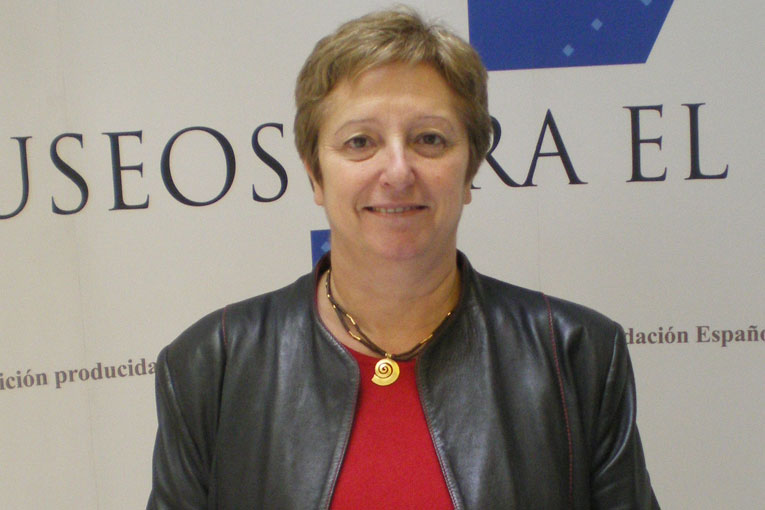|
Founding member of the Association of Women Researchers and Technologists (AMIT) and vice-president from 2001 to 2006, member of the Chair-Network for Women, Science and Technology in Latin-America (from October 2005), General Director of the Spanish Foundation for Science and Technology (FECYT) from 2006 to 2008… This is just a little part of the information we can find in Eulalia Pérez’s CV. She holds a degree in Philosophy and Literature from the Autonomous University of Madrid. More than a hundred books and articles came from her pen or keyboard. La Ley de la Ciencia veinte años después: ¿dónde estaban las mujeres? (The Law of Science twenty years later: where were the women?) or Mujer y ciencia. La situación de las mujeres investigadoras en el sistema español de ciencia y tecnología (Women and science. The situation of women researchers in the Spanish science and technology system) are a couple of examples of her bibliographical production.
Eulalia Pérez found in the University of Cambridge, with professor Geoffrey Lloyd, the way to make her work fit her feminist inquisitiveness. After reading the thesis on the history of Greek astronomy, Eulalia started studying about medicine, and particularly the question of women authorship. «Women in Greece were considered minors, they had no authority. But as doctors could not observe, auscultate or touch them, they had to believe what women or intermediaries told them – she explains. I started there, and began to see there were many more women than science history would make us believe.»
When they ask us about scientists or researchers, the first names that come to mind are often men. Have there not been women in science? Was their name hidden?
History has been fundamentally written by men, so women have been rendered invisible, you cannot see them. It is true that there have been less women than men in science, first because they did not have access to primary education, and second because they could not enter universities either, but there have been a lot more women in science than we commonly know of. There is, in fact, a line of research on the recovery of women in all fields, especially fruitful in science.
And do women currently enjoy more visibility or are they still invisible?
I think they are not seen. I am in the committee of the Spanish Astronomy Association, and a few days ago the secretary sent us the figures of women in time allocation committees for the different Spanish observatories. It turns out there were almost no women in them, and the number had even decreased in the last two years. Thera are women, because the percentage of women astronomers is over 30%, but then their presence is symbolic. That is, they are still made invisible.
Is there a key point in history when we can start talking about the incorporation of women into science?
I think there are three fundamental moments. One was the French Revolution, when Olympe de Gouges reclaimed the rights of women citizens. The next one would be when women entered universities, more or less freely, at the end of the nineteenth and beginning of the twentieth century. The last fundamental moment would be from the seventies – the eighties in Spain – when women realise there is something happening in the scientific field, because we find less women researchers as their career progresses.
Which forms of gender discrimination do we observe in the science and research system?
There was a territorial discrimination before, that is, that under which women go to certain areas and men go to others. We can still appreciate this in engineering, a markedly masculine area, and biomedicine, which is fundamentally feminine. But this discrimination has generally faded. The one that still exists is the hierarchical one. There are less women in higher positions, in decision-making positions, in spite of the Equality Law.
Is this what concepts such as the «glass ceiling» or the «sticky floor»1 mean?
The sticky floor, yes [laughs], indeed. But I would rather talk about a glass box, because we are also limited sideways.
Are women worse in science than in other working environments?
It is more or less the same, but the problem with science is we tend to think it is an institution grounded only in merits, so scientists are very reluctant to realise there are biases in their institution. Three or four years ago we did a study among Spanish astronomers, and when they notice the inequality, because figures don’t lie, they thought that was a general situation in society, but htere was nothing in science producing it.
How would you rank the role of the media in perpetuating or changing these inequalities?
Their role is fundamental, and the problem is they don’t usually realise and keep omitting women. If the media were more consistent and played a more active role on these inequality situations, we would be better off, because everyone understands they are a really strong influence.
«It is necessary, effectively, a normative regulation in order to fight enduring discriminatory manifestations, be they direct or indirect, of a gender base and promote real equality between women and men, with the removal of obstacles and the social stereotypes that prevent us from achieving it.» This is one of the motives explained in the Equality Law passed in Spain seven years ago, in March 2007. Do you think the measures set out by this law were enough?
The intention of a gender perspective in every field of the public administration, the fact that all commissions had to have parity of representation… I think that was more than enough. The problem is that it was not accomplished, because we need to have a gender conscience first, and then the will to follow it. But you only have to look at publicly funded conferences, where there is sometimes not a single woman.
As a conclusion to the Science Law twenty years later, you and Paloma Alcalá said «only treating the unequal unequally, we will be able to make them equal». Is this a bid for positive discrimination?
Exactly. But I prefer talking about compensation, because we are compensating a situation of imbalance. If you have two things at a different level and apply the same measures to both of them, you will still have inequality. If you want to balance the scales you will have to act differently depending on the position. People who criticise quotas do not realise you are destroying the merit principle. As a supporter of quotas I believe you do not have to uplift women for no reason, but with the same requirements and merits you must have the same number of women and men. If you have enough merits to be in a commission and you don’t let them, you are discriminating. Yes, I am an absolute supporter of quotas and affirmative or compensation action.
What other changes would you suggest in order to improve the relation between women and science?
It is essential to educate in gender and egalitarian values from the moment we are babies, that is the only way we can introduce a truly egalitarian policy. I base everything on education. I am very pragmatic in that sense, very Jane Addams.
Let’s travel forward in time, to the year 2034, twenty years from now. If we repeated this interview then, do you think you would answer similarly? Or do you think the future situation of women in the science system will have improved?
Looking back at the last twenty years, given that it is possible to retrogress – because we are going back to the levels of the seventies or eighties, I am an absolute pessimist at the moment. I think I would answer just the same in twenty years, or even worse. I’m sorry [laughs].
1. La socióloga Mabel Burin define el concepto de «suelo pegajoso» como «inercia que mantiene a tantas mujeres inmovilizadas en su puesto de trabajo, atrapadas en la base de la pirámide económica, sin fuerzas para enfrontarse con lo nuevo y desafiar el sistema.» (Go back)
Íngrid Lafita. Journalist (València).
© Mètode 2014.
|
|
«There are somen scientists, but they are still made invisible»
«I would rather talk about a glass box, instead of a glass ceiling, because we are also limited sideways»
«If you don’t introduce quotas you are destroying the merit principle»
«I think in twenty years I would answer just the same, or even worse»
|

 DICYT
DICYT




